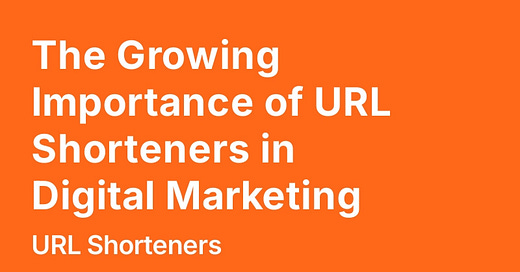Every marketer looks for ways to simplify their efforts while maximizing results. One simple yet powerful tool that has grown in importance over the years is the URL shortener. At first glance, URL shorteners might seem like a small addition to a marketer's toolkit, but they play a critical role in digital marketing strategies. Whether you’re sharing a link on social media, sending out an email campaign, or tracking user behavior, short URLs make your job easier and more effective.
Why Are URL Shorteners Important?
Long URLs can be messy and distracting, especially when sharing them on platforms like Twitter, where space is limited. But URL shorteners go beyond just making links look pretty. They offer several key benefits for digital marketers:
Link Tracking and Analytics: URL shorteners, allow you to track clicks, traffic sources, and user behavior. This gives you valuable insights into how your campaigns are performing.
Better User Experience: Shortened links are easier to share, copy, and click on, improving the user experience, especially on mobile devices.
Branding Opportunities: With branded links, you can create custom short URLs that reflect your brand, making your content more trustworthy and recognizable.
Improved SEO: Shorter, cleaner URLs are easier for search engines to crawl and understand, improving your chances of ranking higher in search results.
Increased Engagement: Short, clear links encourage users to engage more, as they look less suspicious and spammy compared to long, cluttered URLs.
Top 5 URL Shorteners for Digital Marketing
Here’s a look at five popular URL shorteners that marketers use today, along with their pros and cons:
1. Replug
Pros:
Offers robust link analytics to track clicks and audience behavior.
Allows branded URLs to make your links more recognizable.
Includes features like retargeting pixels, which is useful for remarketing campaigns.
Cons:
Some advanced features are only available in premium plans.
2. Bitly
Pros:
Simple and easy-to-use interface for quick link shortening.
Provides detailed analytics for tracking clicks, sources, and locations.
Custom-branded links available for creating trustworthy URLs.
Cons:
Limited features in the free version.
Branded link customization can be expensive.
3. TinyURL
Pros:
Free to use with no sign-up required.
Offers link customization options to make your URLs more descriptive.
Cons:
Lacks advanced analytics compared to other tools.
No branded link options unless you upgrade to a premium version.
4. T2M
Pros:
Provides both short links and QR codes, useful for offline marketing.
Offers a one-time payment plan, which is unique compared to monthly subscription services.
Cons:
Limited branding options for links.
Some users find the dashboard less intuitive than competitors.
5. BL.INK
Pros:
Strong analytics with detailed insights into audience demographics.
Allows you to create branded short links for more visibility and trust.
Cons:
The free plan is quite limited in features.
Pricing can be higher than other alternatives for advanced users.
Conclusion
As digital marketing continues to evolve, URL shorteners are no longer just a tool for shortening links. They’ve become essential for tracking, branding, and improving user experience. Whether you're running a social media campaign, sending email newsletters, or analyzing user behavior, these tools can help boost your marketing efforts. By choosing the right URL shortener that fits your needs, you can take advantage of powerful features that improve your campaigns’ effectiveness.
So, next time you think about sharing a link, remember that shortening it could give you the upper hand in your marketing strategy.



